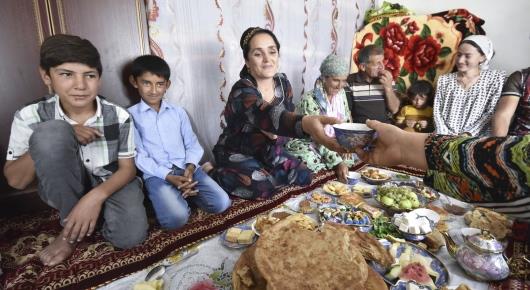Countries unite to invest in healthy nutrition for children

Prevention is better than cure – and more effective, too. Especially if one can start laying the foundations of a healthy diet at a young age.
Last week, experts from several United Nations agencies, along with government representatives from eight countries in Central Asia and the Caucasus, worked through important aspects of tackling one of the greatest health issues of our time: the co-existence of undernutrition, micronutrient deficiency, and overweight and obesity. Discussions centred on the urgent need for a food systems approach to deliver diverse and nutritious diets for children and adolescents.
The Regional Nutrition Capacity Development and Partnership Platform was brought to life in 2018 by FAO, UNICEF, the World Health Organization, and the World Food Programme to promote a better understanding of food systems and nutrition governance and to advocate for higher investments in this area. Participant countries are Armenia, Azerbaijan, Georgia, Kazakhstan, Kyrgyzstan, Tajikistan, Turkmenistan and Uzbekistan.
Under the umbrella of this platform, the symposium on sustainable food systems for children’s healthy diets, held 24–26 April in Nur-Sultan, was dedicated to sustainable food systems and nutrition governance and the importance of financing and promoting investments in child nutrition. Participants reviewed the work that has been done in these areas and defined the priorities for 2019.
Also participating in the event were a group of young children and their mothers, reconfirming the need for reliable and user-friendly nutrition information.
“The platform is a unique forum for all these countries to follow up on their global commitments on nutrition, including the Sustainable Development Goals, and do it with assistance from relevant UN agencies,” said Stineke Oenema, the coordinator of United Nations Standing Committee on Nutrition.
Oenema encouraged participating countries to formulate their own country-specific SMART (specific, measurable, achievable, relevant and time-bound) commitments.
Most countries have a national strategy on nutrition, but national capacities need to be strengthened to successfully implement those strategies. One aim of the platform is to serve as a catalyst for action on nutrition, through the raising of awareness, advocating for investments in nutrition, creating a network of “Nutrition Champions” and fostering region-wide collaboration.
Participant countries recognized the need to strengthen evidence-based policy and programming in nutrition, including the collection of food consumption data and the creation of food-based dietary guidelines.
“Healthy eating is not only an individual responsibility, but the way in which food is produced, processed and distributed to markets is also a key determinant of dietary choice,” said Keigo Obara, FAO food security officer. “Food system policies are essential to make healthy and diversified diets available and affordable.”
2 May 2019, Nur-Sultan, Kazakhstan
